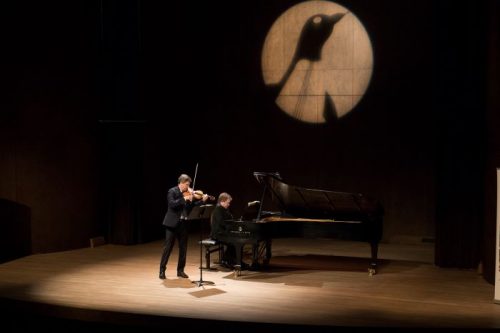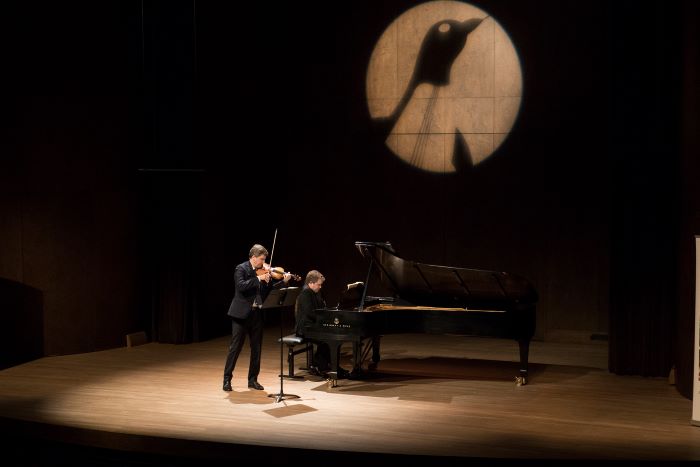
 Canada Beethoven, Bach, Jeffrey Ryan, Prokofiev, Friedrich Hermann: James Ehnes (violin), Andrew Armstrong (piano); Martin Beaver, Heemin Choi, Amy Hillis, Byungchan Lee (violins), Carlos Avila (piano). Bourgie Hall, Montréal Museum of Fine Arts, Montréal. 13.6.2019. (LV)
Canada Beethoven, Bach, Jeffrey Ryan, Prokofiev, Friedrich Hermann: James Ehnes (violin), Andrew Armstrong (piano); Martin Beaver, Heemin Choi, Amy Hillis, Byungchan Lee (violins), Carlos Avila (piano). Bourgie Hall, Montréal Museum of Fine Arts, Montréal. 13.6.2019. (LV)

Concert I
Bach – Partita No.2, BWV1004: Sarabande and Gigue
Jeffrey Ryan – Bellatrix for solo violin (2001)
Fritz Kreisler – Recitativo and Scherzo-Caprice, Op.6
Prokofiev – Sonata for Two Violins, Op.56
Friedrich Hermann – Capriccios for Three Violins, Op.2, Nos.1 and 5
Concert II
Beethoven (arr. Liszt) – Symphony No.8, Op.93; Symphony No.7, Op.92
Concert III
Beethoven – Violin Sonatas, Op.12 Nos. 1 and 2; Op.23; Op.12, No.3
With the Chamber Music Festival of Montréal’s penguin logo projected on the Bourgie Hall back wall like Batman’s bat-signal on the skyline of Gotham City, James Ehnes and Andrew Armstrong opened their complete performance of Beethoven’s ten sonatas for violin and piano with the three from Op.12 and the single Op.23.
In the hall’s gorgeous acoustics and before a full house of warmly enthusiastic classical aficionados, it was like listening to music for the first time while reading the score, as Ehnes and Armstrong translated the hieroglyphics on the printed page. They produced a wonderful variety of color, nuance and feeling, as if the notes themselves were no longer black and white but animated with color and shape as they proceeded across the bar lines, each on its own staff. Hearing Beethoven played with this kind honesty makes one know the composer more, and allows an emotional understanding of why this music meant so much to the man who composed it.
Another prominent feature of any complete cycle of the sonatas is the evolution of the power balance between the two instruments. Ehnes and Armstrong handled this organically, so that by the time the agitated Op.23 arrived (three years later after the relatively uncomplicated Op.12), Ehnes was already starting to assert himself — raising the question of why Beethoven called the genre ‘Sonatas for Piano and Violin’. In fact, while from the beginning it was clear that Armstrong’s brilliant palette and resonance were going to be factors, it was equally clear that Ehnes’s pure tone was going to be able to project and hold its own against the piano — whether a hushed pianissimo or a commanding fortissimo.
Ehnes and Armstrong were also generous with repeats, which served them well because it took them a little time to warm up and adjust to the hall, and to sense the enthusiasm and trust of the audience. Once they hit their stride in the second repeat, their infectious energy, lilt, and lyricism carried the day.
In all of this evolution, the duo never missed a note. In the third of Op.12, one of Beethoven’s first big pieces, they splendidly projected its symphonic character, handled the first movement’s brilliant triplets with consummate ease, and in the second movement resisted charm in favor of big ideas, given drama and imagination.
In addition to the Ehnes-Armstrong cycle, the festival is also featuring ‘The Bank of Montréal’s Hottest Classical Artists Under 30’ playing instruments from the Canada Council for the Arts’ Musical Instrument Bank, and a courageous quintet of pianists taking on Liszt’s formidable adaptations of Beethoven’s nine symphonies.
The festival’s daily bounty had begun earlier at a free noontime concert of violinists. Heemin Choi and Byungchan Lee played Bach and Prokofiev, and were joined by the over-30 Martin Beaver (formerly with the Tokyo Quartet, his prize Colburn student Hao Zhou just won the Montréal Concours), in delirious performances of obscure (except to violinists) capriccios by Friedrich Hermann. in the midst of all this serious stuff, Amy Hillis twisted, screamed and shouted out Jeffrey Ryan’s Bellatrix, with vocalizations and breath sounds, its aggression and inspired by the star that marks Orion’s left shoulder, translated as a ‘female warrior’.
At five in the afternoon, pianist Carlos Avila took on Liszt vs. Beethoven in the Seventh and Eighth Symphonies. It was a hard-fought draw in which moments of melodrama alternated with moments of decadently gorgeous sound, like the Trio of the Eighth, with its great French horn solos transported magically to the keyboard.
Laurence Vittes
